- Clone
- UCHT2 (See other available formats)
- Regulatory Status
- RUO
- Workshop
- III 518
- Other Names
- Leu-1, Ly-1, T1, Tp67
- Isotype
- Mouse IgG1, κ
- Ave. Rating
- Submit a Review
- Product Citations
- publications
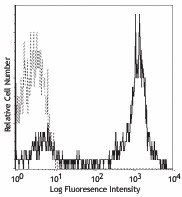
-

Human peripheral blood lymphocytes were stained with purified CD5 (UCHT2) (solid line) or purified mouse IgG1, κ (dashed line), followed by anti-mouse IgG PE.
| Cat # | Size | Price | Quantity Check Availability | Save | ||
|---|---|---|---|---|---|---|
| 300602 | 100 µg | 79€ | ||||
CD5 is a 67 kD single chain type I glycoprotein also known as Leu-1, Ly-1 and T1. It is a member of the scavenger receptor superfamily found on T cells, thymocytes, B cell subsets, chronic B lymphocytic leukemia (B-CLL), and peripheral blood dendritic cells. CD5 modulates T and B cell receptor signaling, thymocyte maturation, and T-B cell interactions upon binding to ligands such as CD72.
Product DetailsProduct Details
- Verified Reactivity
- Human
- Reported Reactivity
- Chimpanzee, Capuchin Monkey, Common Marmoset, Rhesus
- Antibody Type
- Monoclonal
- Host Species
- Mouse
- Formulation
- Phosphate-buffered solution, pH 7.2, containing 0.09% sodium azide.
- Preparation
- The antibody was purified by affinity chromatography.
- Concentration
- 0.5 mg/ml
- Storage & Handling
- The antibody solution should be stored undiluted between 2°C and 8°C.
- Application
-
FC - Quality tested
IHC-F, WB - Reported in the literature, not verified in house - Recommended Usage
-
Each lot of this antibody is quality control tested by immunofluorescent staining with flow cytometric analysis. For immunofluorescent staining, it is recommended to use at ≤ 1.0 µg per 106 cells in 100 µl volume or 100 µl of whole blood. It is recommended that the reagent be titrated for optimal performance for each application.
- Application Notes
-
Additional reported applications (for the relevant formats) include: Western blotting2 and immunohistochemical staining of acetone-fixed frozen sections2,5.
-
Application References
(PubMed link indicates BioLegend citation) -
- Knapp W, et al. 1989. Leucocyte Typing IV Oxford University Press. New York.
- Renaudineau Y, et al. 2005. Blood 106:2781. (WB IHC)
- Porter JC and Hogg N. 1997. J. Cell Biol. 138:1437.
- Saliba AE, et al. 2010. P. Natl. Acad. Sci. USA 107:14524. PubMed
- Kap Y, et al. 2009. J. Histochem. Cytochem. 57:1159. (IHC)
- Product Citations
-
- RRID
-
AB_314088 (BioLegend Cat. No. 300602)
Antigen Details
- Structure
- Scavenger receptor superfamily, 67 kD
- Distribution
-
T cells, thymocytes, B cell subset, B cell CLL, peripheral blood dendritic cells
- Function
- Modulates TCR, BCR signaling, thymocyte maturation, T-B cell interaction
- Ligand/Receptor
- CD72
- Cell Type
- B cells, Dendritic cells, Leukemia, T cells, Thymocytes
- Biology Area
- Costimulatory Molecules, Immunology
- Molecular Family
- CD Molecules
- Antigen References
-
1. Kipps T. 1988. Adv. Immunol. 47:117.
2. Resnick D, et al. 1993. Trends Biochem. Sci. 19:5.
3. Wood GS, et al. 1992. Am. J. Pathol. 14:789. - Gene ID
- 921 View all products for this Gene ID
- UniProt
- View information about CD5 on UniProt.org
Other Formats
View All CD5 Reagents Request Custom Conjugation| Description | Clone | Applications |
|---|---|---|
| APC anti-human CD5 | UCHT2 | FC |
| Biotin anti-human CD5 | UCHT2 | FC |
| FITC anti-human CD5 | UCHT2 | FC |
| PE anti-human CD5 | UCHT2 | FC |
| Purified anti-human CD5 | UCHT2 | FC,IHC-F,WB |
| Alexa Fluor® 647 anti-human CD5 | UCHT2 | FC |
| PerCP anti-human CD5 | UCHT2 | FC |
| PerCP/Cyanine5.5 anti-human CD5 | UCHT2 | FC |
| PE/Cyanine7 anti-human CD5 | UCHT2 | FC |
| Pacific Blue™ anti-human CD5 | UCHT2 | FC |
| Brilliant Violet 421™ anti-human CD5 | UCHT2 | FC |
| Purified anti-human CD5 (Maxpar® Ready) | UCHT2 | FC,CyTOF® |
| APC/Cyanine7 anti-human CD5 | UCHT2 | FC |
| Alexa Fluor® 700 anti-human CD5 | UCHT2 | FC |
| PE/Dazzle™ 594 anti-human CD5 | UCHT2 | FC |
| TotalSeq™-A0138 anti-human CD5 | UCHT2 | PG |
| TotalSeq™-C0138 anti-human CD5 | UCHT2 | PG |
| APC/Fire™ 750 anti-human CD5 | UCHT2 | FC |
| Brilliant Violet 711™ anti-human CD5 | UCHT2 | FC |
| TotalSeq™-B0138 anti-human CD5 Antibody | UCHT2 | PG |
| TotalSeq™-D0138 anti-human CD5 | UCHT2 | PG |
| Brilliant Violet 510™ anti-human CD5 | UCHT2 | FC |
| Spark Red™ 718 anti-human CD5 (Flexi-Fluor™) | UCHT2 | FC |
| Brilliant Violet 605™ anti-human CD5 | UCHT2 | FC |
Customers Also Purchased
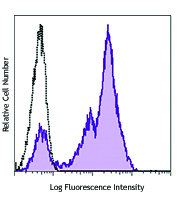
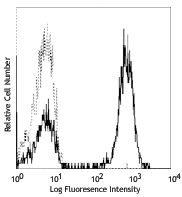
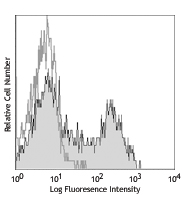
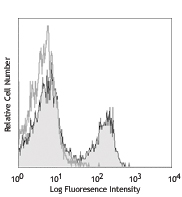
Compare Data Across All Formats
This data display is provided for general comparisons between formats.
Your actual data may vary due to variations in samples, target cells, instruments and their settings, staining conditions, and other factors.
If you need assistance with selecting the best format contact our expert technical support team.
-
APC anti-human CD5
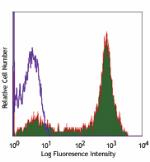
Human peripheral blood lymphocytes were stained with CD5 (UC... -
Biotin anti-human CD5
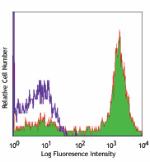
Human peripheral blood lymphocytes were stained with biotiny... -
FITC anti-human CD5
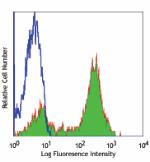
Human peripheral blood lymphocytes were stained with CD5 (UC... -
PE anti-human CD5
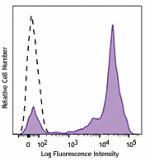
Human peripheral blood lymphocytes were stained with CD5 (cl... -
Purified anti-human CD5
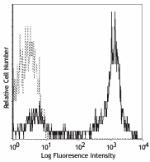
Human peripheral blood lymphocytes were stained with purifie... -
Alexa Fluor® 647 anti-human CD5
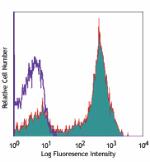
Human peripheral blood lymphocytes were stained with CD5 (UC... -
PerCP anti-human CD5
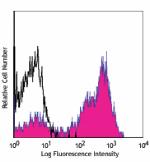
Human peripheral blood lymphocytes were stained with CD5 (UC... -
PerCP/Cyanine5.5 anti-human CD5

Human peripheral blood lymphocytes were stained with CD3 APC... -
PE/Cyanine7 anti-human CD5
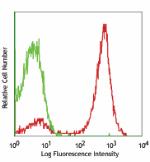
Human peripheral blood lymphocytes were stained with CD5 (UC... -
Pacific Blue™ anti-human CD5
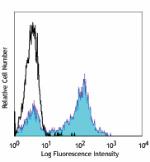
Human peripheral blood lymphocytes were stained with CD5 (UC... -
Brilliant Violet 421™ anti-human CD5
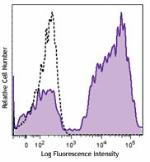
Human peripheral blood lymphocytes were stained with CD5 (cl... -
Purified anti-human CD5 (Maxpar® Ready)
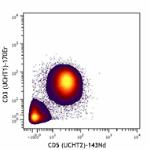
Human PBMCs stained with 143Nd anti-CD5 (UCHT2) and 170Er an... -
APC/Cyanine7 anti-human CD5

Human peripheral blood lymphocytes were stained with CD3 FIT... -
Alexa Fluor® 700 anti-human CD5
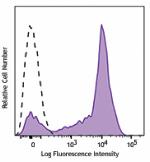
Human peripheral blood lymphocytes were stained with CD5 (cl... -
PE/Dazzle™ 594 anti-human CD5
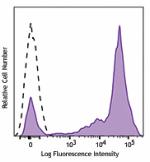
Human peripheral blood lymphocytes were stained with CD5 (cl... -
TotalSeq™-A0138 anti-human CD5
-
TotalSeq™-C0138 anti-human CD5
-
APC/Fire™ 750 anti-human CD5
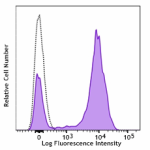
Human peripheral blood lymphocytes were stained with CD5 (cl... -
Brilliant Violet 711™ anti-human CD5
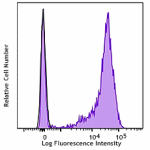
Human peripheral blood lymphocytes were stained with CD5 (cl... -
TotalSeq™-B0138 anti-human CD5 Antibody
-
TotalSeq™-D0138 anti-human CD5
-
Brilliant Violet 510™ anti-human CD5

Human peripheral blood lymphocytes were stained with anti-hu... -
Spark Red™ 718 anti-human CD5 (Flexi-Fluor™)
-
Brilliant Violet 605™ anti-human CD5

Human peripheral blood lymphocytes were stained with anti-hu...
 Login / Register
Login / Register 








Follow Us